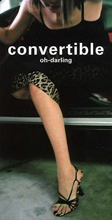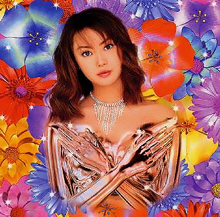
The discography of Japanese R&B singer Misia consists of nine studio albums, three compilation albums, one extended play (EP), one live album, six remix albums, twenty-six singles, twelve promotional singles, eighteen video albums and thirty-seven music videos. In 1997, Misia signed a recording contract with BMG Japan and joined the then up-and-coming talent agency, Rhythmedia. Under the sub-label Arista Japan, Misia released her first single, "Tsutsumikomu Yō ni..." in February 1998, followed by "Hi no Ataru Basho" in May. In June, her debut album, Mother Father Brother Sister, opened at number three on the Oricon chart. The album peaked at number one three weeks later and stayed in the top five for eleven consecutive weeks. Mother Father Brother Sister was certified double million and won a Japan Record Award for Best Album, as well as a Japan Gold Disc Award for Pop Album of the Year. In 2000, Misia's second studio album, Love Is the Message, debuted at number one and was certified double million. It won a Japan Record Award for Best Album and a Japan Gold Disc Award for Pop Album of the Year. The album spawned three top ten hits: "Believe," "Wasurenai Hibi" and "Sweetness." Misia's first remix album, Misia Remix 2000 Little Tokyo, was released three months later and shot to number one. It sold over 800,000 copies and is the second best-selling remix album of all time in Japan.

"In My Soul/Snow Song from Mars & Roses" is the thirteenth single by Japanese recording artist Misia. It was released on December 3, 2003 as the second single from Misia's fifth studio album Mars & Roses.

"Densetsu no Shōjo" is the first single by Japanese recording artist Arisa Mizuki. It was released on May 15, 1991 as the first single from Mizuki's debut studio album Arisa. The title song was written and composed by Amii Ozaki. It was inspired by Anri's "Olivia o Kikinagara," also produced by Ozaki. The song was used in commercials for the Chasse soft drink by Kirin, starring Mizuki herself.

"Eden no Machi" is the second single by Japanese recording artist Arisa Mizuki. It was released on August 28, 1991 as the second single from Mizuki's debut studio album Arisa. The title song was written by Jun Taguchi and composed and produced by Princess Princess vocalist and guitarist Kaori Okui. The song is Mizuki's only A-side to not have a commercial tie-in.

"Kaze no Naka de" is the third single by Japanese recording artist Arisa Mizuki. It was released on November 21, 1991 as the third and final single from Mizuki's debut studio album Arisa. Both the A-side and B-side were written and composed by Amii Ozaki. The title track, "Kaze no Naka de," served as theme song for Mizuki's first feature film Chō Shōjo Reiko. "Graduation " served as theme song for the Japanese dub of the animated series Babar. "Kaze no Naka de," which was written for Mizuki's debut album Arisa, was released as a single at Mizuki's request.

Arisa is the debut studio album by Japanese recording artist Arisa Mizuki, released through Nippon Columbia on December 4, 1991. Arisa is predominately a pop music album. It is written by an array of famous Japanese musicians, including Amii Ozaki, Princess Princess vocalist Kaori Okui, Takeshi Kobayashi, Tetsuya Komuro, and The Alfee guitarist Toshihiko Takamizawa. In its review of the album, CDJournal described Arisa as an "idol record" that can appeal to actual music lovers. The online magazine praised Mizuki's vocal ability for being "far greater than the typical teenager" and noted that the only apparent flaw was the album's lack of cohesion.

"Too Shy Shy Boy!" is the fourth single by Japanese recording artist Arisa Mizuki. It was released on May 27, 1992 as the lead single from Mizuki's second studio album Shake Your Body for Me. The title track was written and produced by Tetsuya Komuro. It was used in commercials for the soft drink Chasse by Kirin, starring Mizuki herself. Komuro recorded a self-cover of the song for his album Hit Factory. "Too Shy Shy Boy!" is Mizuki's best-selling single. The B-side, "Haru no Tobira," was written and produced by singer-songwriter Midori Karashima and was used in commercials for the Soft MA contact lenses by Menicon, also starring Mizuki.

"Kotoshi Ichiban Kaze no Tsuyoi Gogo" is the fifth single by Japanese recording artist Arisa Mizuki. It was released on May 12, 1993 as the first single from Mizuki's first compilation album Fiore: Arisa Collection. The title track was written and composed by Yumi Matsutoya, under the pen-name Karuho Kureta. It was used in commercials for the soft drink Chasse by Kirin, starring Mizuki herself. "Sunao ni Naritai," is Mizuki's second consecutive B-side to be written and produced by singer-songwriter Midori Karashima.

"Kimi ga Suki Dakara" is the sixth single by Japanese recording artist Arisa Mizuki. It was released on August 11, 1993 as the second single from Mizuki's first compilation album Fiore: Arisa Collection.

"Happy Wake Up!" is the seventh single by Japanese recording artist Arisa Mizuki. It was released on October 3, 1994 as the lead single from Mizuki's third studio album Arisa III: Look. The title track was written and produced by Tetsuya Komuro. "Happy Wake Up!" is Mizuki's second single produced by Komuro. The song was written at Mizuki's request for an upbeat track to sing in concert. It was used in commercials for Knorr Cup Soup by Ajinomoto, starring Mizuki herself. The B-side, "Close to You," was also written and produced by Komuro.

"Dakishimete!" is the ninth single by Japanese recording artist Arisa Mizuki. It was released on May 24, 1995 as the second single from Mizuki's fourth studio album Cute. Both the title track and B-side, "Zutto Soba ni Ite," were written by Masanori Nagaoka, and composed by Yasuhiko Hoshino. "Dakishimete!" was used in commercials for Umi to Taiyō no Megumi de Arau Body Soap by Shiseido, starring Mizuki herself.

"Promise to Promise" is the twelfth single by Japanese recording artist Arisa Mizuki. It was released on July 24, 1996 as the first and only single from Mizuki's second compilation album Arisa's Favorite: T.K. Songs, which features the "Urban Street Mix" version. The "Straight Run" version was included on Mizuki's third compilation album Fiore II. The title track served as theme song for the first season of the Fuji TV drama Nurse no Oshigoto, starring Mizuki herself. "Promise to Promise" was written by Tetsuya Komuro and Takahiro Maeda, and composed and produced by Komuro, making it Mizuki's fourth single to be produced by Komuro. Komuro wrote the song after having read the script for the drama.

"Oh Darling" is a single by Japanese recording artist Alisa Mizuki, released under the unit name Convertible, which is composed of Mizuki and Japanese model Kayato. It was released on July 8, 1998 as the third single from Mizuki's fifth studio album Innocence. The title track was written by Tetsuya Komuro and Marc Panther and composed and produced by Komuro. "Oh Darling" is Mizuki's fifth A-side to be produced by Komuro, the first since "Promise to Promise" (1996). The song served as theme song for the Fuji TV Getsuku drama Boy Hunt, starring Mizuki herself.

"Break All Day!" is the eighteenth single by Japanese recording artist Alisa Mizuki. It was released on May 10, 2000 as the first single from Mizuki's fourth compilation album History: Alisa Mizuki Complete Single Collection.

"Megami no Mai" is the nineteenth single by Japanese recording artist Alisa Mizuki. It was released on August 23, 2000 as the second single from Mizuki's fourth compilation album History: Alisa Mizuki Complete Single Collection.

"Love Potion" is the twenty-first single by Japanese recording artist Alisa Mizuki. It was released on August 21, 2002, as the fifth single from Mizuki's fourth compilation album History: Alisa Mizuki Complete Single Collection. The title track is a Japanese-language cover Christina Aguilera's "Genie in a Bottle" (1998). The Japanese lyrics were written by Takeshi Aida (相田毅). The song served as theme song for the fourth and final season of the Fuji TV drama Nurse no Oshigoto.

Arisa II: Shake Your Body for Me is the second studio album by Japanese recording artist Arisa Mizuki, released through Nippon Columbia on October 1, 1992. Arisa II: Shake Your Body for Me is predominately a pop and dance music album. It is written and produced by an array of famous Japanese musicians, including Anri, Keizō Nakanishi, Takao Konishi, and Tetsuya Komuro.

Fiore is the first compilation album by Japanese recording artist Arisa Mizuki, released through Nippon Columbia on October 1, 1993. The eleven-track set features a selection of songs from Mizuki's first two studio albums, Arisa and Arisa II: Shake Your Body for Me, as well as two original songs. It is Mizuki's first album to include the original versions of both "Densetsu no Shōjo" (1991) and "Too Shy Shy Boy!" (1992).

Cute is the fourth studio album by Japanese recording artist Arisa Mizuki, released through Nippon Columbia on July 21, 1995. It is predominately a pop music album. Cute was released only seventh months after Arisa III: Look and is Mizuki's last studio album to be released under Nippon Columbia. The album produced two singles, "Anata no Sedai e Kuchizuke o", written and produced by Tetsuya Komuro, and "Dakishimete!." Both singles debuted within the top twenty, with "Anata no Sedai e Kuchizuke o" becoming Mizuki's last single to break the top ten. Despite not being released as a single, track seven, "Kagayaite Ite ," was used as theme song for the NHK television and radio program Minna no Uta throughout June and July 1995.

Arisa's Favorite: T.K. Songs is the second compilation album by Japanese recording artist Arisa Mizuki, released through Nippon Columbia on November 27, 1996. The twelve-track set is a collection of songs written and produced by Tetsuya Komuro, selected from Mizuki's past albums and singles. The compilation is Mizuki's last album on which she is credited as Arisa Mizuki.






















